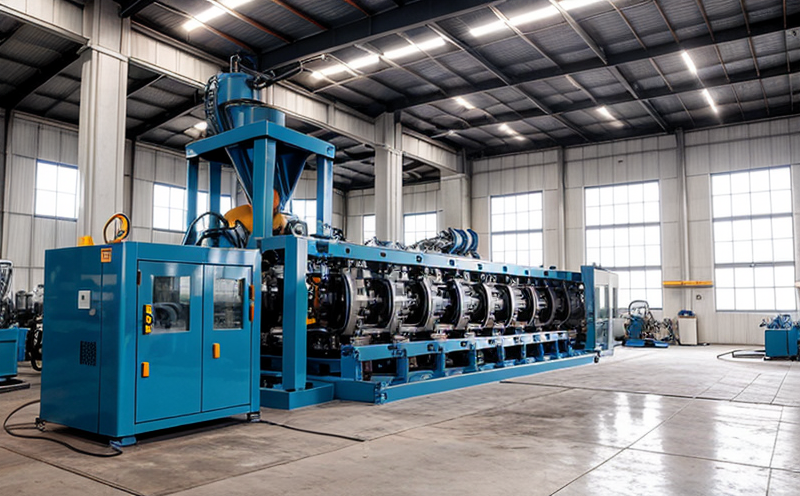ISO 1219 Pneumatic Equipment Performance Testing
The ISO 1219 series of standards provides a comprehensive framework for testing and assessing pneumatic equipment. This service focuses on the performance testing as outlined in ISO 1219-1:2017, which specifically addresses the testing procedures for pneumatic systems, particularly those used in industrial manufacturing and processing.
The primary goal of this service is to ensure that pneumatic equipment meets international quality standards. By conducting these tests, we help manufacturers verify the reliability, safety, and efficiency of their products before they reach the market or are deployed in critical industrial processes. This testing process is crucial for industries such as automotive, aerospace, and manufacturing where precision and performance are paramount.
The scope of ISO 1219 Pneumatic Equipment Performance Testing involves a series of standardized tests that evaluate various aspects of pneumatic equipment including flow characteristics, pressure regulation, and component compatibility. These tests are designed to identify potential issues early in the product lifecycle, which can significantly reduce costs associated with rework or recalls.
During testing, we use specialized equipment to simulate real-world operating conditions. This includes high-pressure chambers, precision measurement instruments, and data acquisition systems that collect detailed performance metrics. Our team of engineers ensures that each test is conducted rigorously according to the prescribed ISO 1219-1:2017 guidelines.
The testing process typically begins with a thorough inspection of the equipment to ensure it meets basic specifications before proceeding to functional tests. These tests involve applying specified air pressures and measuring the resulting flow rates, pressure drops, and component performance under various conditions. We also conduct leak tests to ensure there are no unintended losses of compressed air.
Once all tests have been completed, our engineers compile detailed reports that document every aspect of the testing process. These reports serve as valuable tools for quality control departments and R&D teams by providing objective data on equipment performance. They allow for continuous improvement of products through iterative design changes based on real-world test results.
For customers who require additional services beyond simple compliance testing, we offer assistance with standardization efforts towards international acceptance. Our team can assist in drafting technical specifications or contributing to standards committees where relevant. This support helps clients navigate complex regulatory environments more effectively and ensures their products are well-positioned for global markets.
In summary, ISO 1219 Pneumatic Equipment Performance Testing is an essential service that contributes significantly to maintaining high-quality industrial equipment across various sectors. By adhering strictly to international standards like those specified in ISO 1219-1:2017, we ensure our clients achieve robust, reliable performance from their pneumatic systems.
Industry Applications
| Industry | Pneumatic Equipment Types Tested | Description of Application |
|---|---|---|
| Aerospace | Cylinders, actuators, and flow control valves | Tight tolerances and high reliability are critical for aircraft systems. Testing ensures safe operation under extreme conditions. |
| Automotive Manufacturing | Valves, sensors, and pneumatic tools | Precision in manufacturing processes is key to producing quality vehicles. Our tests ensure components work flawlessly within tight tolerances. |
| Machinery Maintenance | Cylinders, actuators, and flow control devices | Regular testing helps prevent downtime by identifying potential issues early on. This extends the life of expensive machinery while maintaining output levels. |
| Food Processing | Pumps, valves, and regulators | Hygiene is crucial in food processing plants. Testing ensures no contamination can occur due to improper sealing or wear. |
| Pharmaceutical Manufacturing | Cylinders, actuators, and flow control devices | Precision is vital for maintaining product quality standards. Testing helps ensure all equipment operates correctly without affecting drug purity. |
| Construction Equipment | Cylinders, valves, and actuators | Durability in harsh environments is essential for construction machinery. Testing ensures components can withstand heavy use while remaining reliable. |
International Acceptance and Recognition
The ISO 1219 series of standards has gained widespread acceptance across numerous industries due to its rigorous testing methodologies and focus on ensuring consistent quality. Many countries have adopted these standards as part of their national regulations, making compliance with them an important step in entering global markets.
Our laboratory is accredited by multiple international bodies including ISO/IEC 17025 and participates actively in the revision process for relevant standards. This ensures that our tests remain current with evolving industry needs while maintaining strict adherence to established guidelines.
The recognition given to ISO 1219 Pneumatic Equipment Performance Testing extends beyond mere compliance; it also enhances a company’s reputation among peers and customers alike. Demonstrating commitment to quality through such stringent testing demonstrates leadership within the field and fosters trust between partners involved in supply chains or collaborative projects.
Competitive Advantage and Market Impact
Adopting ISO 1219 Pneumatic Equipment Performance Testing offers significant competitive advantages for manufacturers. It not only enhances product quality but also contributes to cost savings through reduced warranty claims and improved reliability, which translates into higher customer satisfaction.
In today’s competitive market, where innovation drives growth, having robust testing practices ensures that new products meet or exceed expectations right from the start. This early assurance of performance reduces delays in bringing innovative solutions to market, thereby gaining a first-mover advantage over competitors.
Moreover, adhering to international standards like ISO 1219 helps companies position themselves favorably when bidding on contracts requiring stringent quality criteria. It opens doors to lucrative opportunities within both domestic and export markets by aligning with global industry norms.





